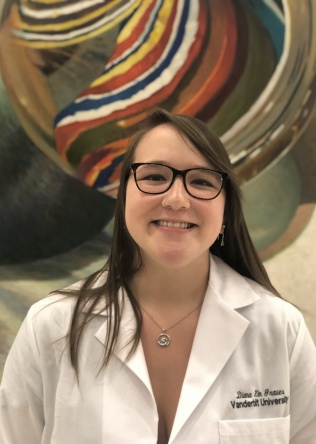Diana Graves
Diana received her B.S. in Chemistry from the University of North Georgia. Her undergraduate research focused on expressing homologs, comparing kinetics, and using site-directed mutagenesis to better understand the catalytic mechanism of the novel enzyme MfnB under the direction of Dr. Yu Wang. Diana entered Vanderbilt University in 2019 through the QCB program. She then joined the Young Kim lab under the Molecular Pathology and Immunology graduate training program.
Diana's research focuses on studying immune cell infiltration in the tumor microenvironment. Her project involves analyzing the factors affecting macrophage polarization and cancer-associated fibroblast phenotypes in the context of head and neck cancer.
Natalie Favret
Sharareh Ameli
Liz Roelofsz
Liz Roelofsz, is the program manager of the Microbe-Host Interactions Ph.D. Program and the Molecular Pathology & Immunology Ph.D. Program at Vanderbilt University Medical Center. She obtained her MBA in 2016 and has a professional background in higher education. She previously worked for the Department of Pathology, Microbiology and Immunology and made the transition to MPI/MHI Program Manager to work more closely with the students.
George Xu
Gabriel J Rodriguez
Megan M Erwin
Kaitlyn E Bunn
Elizabeth Brunner Wescott
Elizabeth (Brunner) Wescott is a graduate student, originally from many states as a Navy brat growing up, but she calls North Carolina her hometown. She completed her undergrad at Davidson College, where she did an honors thesis on mitochondrial membrane shaping in Drosophila, as well as a summer internship at Ohio State University investigating non-autonomous gene expression variance in the Ras pathway. She then took a job at Duke University as a research assistant. There, she transitioned to the field of immunology, studying HIV infection of kidney and HIV vaccine development. She started at Vanderbilt in August 2018 and joined the Balko Lab in April 2019. Outside the lab, she enjoys spending time outdoors hiking and hammocking with her husband, climbing, running, baking, playing music, and traveling.
I am interested in immune cell infiltration in the tumor microenvironment and I'm studying the role of B7-H4 on tumor immune cell activation states to improve immunotherapy outcomes in breast cancer. I also study the mechanism and regulation of B7-H4 expression in breast cancer.










